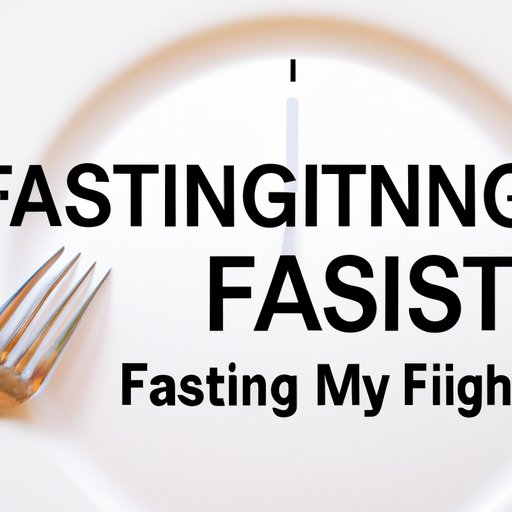
Introduction
When it comes to weight loss, there are countless diet plans and strategies to choose from. One approach that has gained popularity in recent years is fasting. While there are many different kinds of fasting, each with its own unique benefits and drawbacks, one key question remains: how many hours should you fast for weight loss? In this article, we’ll explore the science behind fasting and weight loss, examine different fasting strategies, and help you find the sweet spot between hunger and results.
The Science behind Fasting and Weight Loss: How Many Hours are Optimal?
Fasting has been shown to have a variety of benefits for weight loss, including reducing insulin levels, increasing fat burning, and boosting metabolism. Some of the most commonly used types of fasting include time-restricted feeding, alternate-day fasting, and extended fasting.
So, what is the optimal fasting duration for weight loss? The answer may depend on a variety of factors, including your overall health, goals, and lifestyle. According to scientific research, most people see the greatest weight loss benefits from fasting for between 14-24 hours at a time.
Intermittent Fasting: How Long Should You Fast for Weight Loss?
Intermittent fasting is a popular fasting strategy that involves alternating between periods of eating and fasting. Some of the most common intermittent fasting schedules include the 16:8 (eating within an 8-hour window and fasting for 16 hours), and the 5:2 (eating normally for 5 days and restricting calories to 500-600 for 2 days).
Research has shown that intermittent fasting can be an effective strategy for weight loss, with most people experiencing significant benefits after several weeks of following an intermittent fasting schedule. The optimal fasting duration for weight loss may depend on the specific type of intermittent fasting you choose, but most people will see results with anywhere from 12-24 hours of fasting per day.
The Benefits of Shorter Fasting Periods for Weight Loss
While longer fasting periods can be effective for weight loss, there are also benefits to shorter fasting periods. Time-restricted feeding (TRF), for example, involves fasting for a set number of hours each day (usually around 12-16 hours), and eating all meals within a condensed time period. Research has shown that TRF can have a positive impact on weight loss, as well as other health markers such as blood sugar levels and insulin resistance.
Incorporating shorter fasting periods into your weight loss plan can be a great way to begin exploring fasting and its benefits, while still allowing yourself to eat regularly throughout the day. Experimenting with different fasting durations can help you find the right balance between hunger and results.
Fasting for Weight Loss: Finding the Sweet Spot between Hunger and Results
One of the biggest challenges of fasting for weight loss is finding the right balance between hunger and results. While some hunger is to be expected during fasting, it’s important not to overdo it or push yourself too hard. Staying hydrated, drinking tea or coffee, and consuming fibrous, low-calorie foods during fasting periods can help stave off hunger and keep you on track.
It’s also crucial to adjust your fasting period as needed in order to optimize results. For example, if you’re experiencing extreme hunger and lethargy during a 24-hour fast, it may be better to switch to a shorter fasting duration such as 16 hours per day. Listening to your body and being mindful of your individual needs and goals can help you find the right fasting duration for your specific situation.
The Impact of Fasting Duration on Weight Loss Success: What the Latest Research Says
Research on fasting and weight loss has produced a variety of conflicting findings, with some studies showing significant weight loss benefits from longer fasting durations and others showing similar results from shorter fasting periods. One recent study found that alternate-day fasting (24 hours of fasting followed by 24 hours of eating) was just as effective for weight loss as traditional calorie restriction diets.
While there is still much to learn about the relationship between fasting duration and weight loss outcomes, it’s clear that fasting can be an effective tool for promoting weight loss and improving overall health.
How to Determine the Ideal Fasting Duration for Your Weight Loss Goals
Determining the best fasting duration for your individual needs and goals may take some experimentation. Factors to consider when choosing a fasting duration include your health status, lifestyle, and personal preferences. It’s also important to consult with a healthcare professional before beginning any new diet or fasting program, especially if you have underlying health conditions or are taking medications.
As you begin exploring different fasting durations, be sure to listen to your body and adjust as needed. Pay attention to hunger levels, energy levels, and any other changes in your physical or mental well-being. With patience, persistence, and a willingness to experiment, you can find the right fasting duration for your weight loss goals.
Conclusion
Fasting can be an effective and healthy way to promote weight loss and improve overall health. Finding the right fasting duration for your individual needs and goals may take some experimentation, but the benefits can be well worth the effort. Be sure to consult with a healthcare professional before beginning any new diet or fasting program, and don’t be afraid to adjust your fasting duration as needed in order to optimize results. With time, dedication, and a little bit of trial and error, you can find the sweet spot between hunger and results that works best for you.




